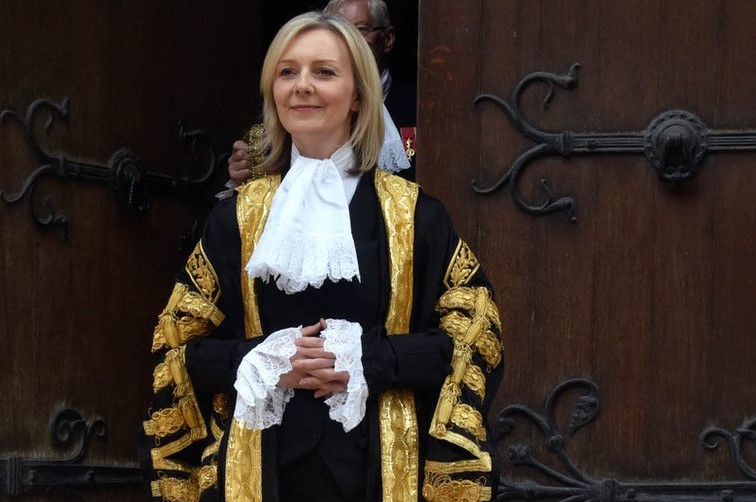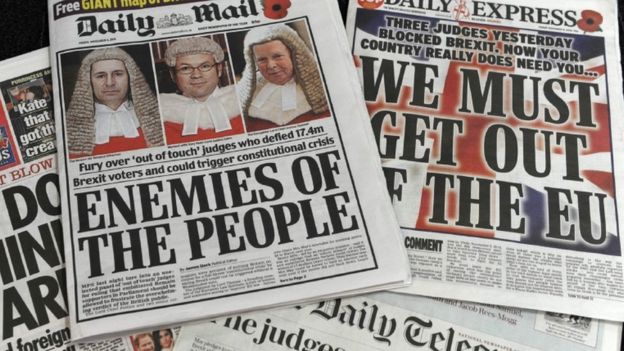AFP photo
By
Alan Share
Methinks the Bar Council doth protest too much!
EVERYONE HAS THEIR OWN AGENDA… EVEN LAWYERS
So, I now ask whether the Bar Council, choosing to speak for over 15,000 Barristers, had its own agenda when it criticised the Daily Mail and the Media’s attack on the ruling of the High Court on Parliament’s role in progressing Brexit? Maybe their knee-jerk reaction was simply a Pavlovian reflex and not the bias of a vested interest? You decide.
You have to ask whether the Bar Council sees Brexit as a threat to the European Court of Justice, the factory for the mass production of human rights that the Bar feeds off? That Court, as I have said often elsewhere, converts claims into rights, ignores the fact that quite often one person’s right can be another person’s restriction. As they ratchet up these rights, they validate them on the argument that all rights are equal when often they are unequal, different and sometimes they conflict with each other.
What is required is not the making of new rights but mediating them. The ratchet effect of human conduct is currently ratcheting in totally the wrong direction altogether.
So, when the Daily Mail and the Media attacked the decision of three High Court Judges directing the Government to secure the approval of Parliament before triggering Article 50 to leave the EC, the Bar Council lambasted them for “serious and unjustified attacks on the judiciary”. Outrageous! Note the word “unjustified”; said it was an attack on the independence of the judiciary, when it was no such thing.
AFP photo
The Bar Council was usurping the role of the Supreme Court that will decide the matter. By their intervention, a few people, acting in the name of over 15,000 barristers, effectively hijacked the Bar Council to pervert the course of justice by seeking to influence that decision. This is apart from the little mischief of criticising the Lord Chancellor urging Ms Truss to “uphold the rule of law.” Outrageous, again! How presumptuous can you get?!
I personally hope that the Supreme Court, unlike those who spoke in the name of the Bar Council, will not be swayed by factors that should be out of their minds and help to restore order to the process that the clear result of the Referendum now requires. In this new and totally unprecedented situation Parliament must be taken to have intended the consequences of its decision to hold a Referendum.
The Executive should receive the mandate of the electorate and negotiate with the EC as best it can. Only when the negotiations are complete should Parliament be involved, then invited to repeal the European Communities Act 1972 which binds us to Europe.
It is totally facile to invite Parliament to choose between “hard Brexit” or a “soft Brexit” giving its blessing to one and denying it to the other. It is amazing how many people in politics and the media imagine that this would be in any way meaningful. So many people live in the world of “wouldn’t it be nice if,” especially Human Rights lawyers – the Pass-a-law-solve-a-problem brigade! The Feel Gooders!
Whether it is one or the other does not depend on Parliament at all. It depends on the EC and, at this stage, that is impossible to foretell, still less to control. The mandate is not “hard” or “soft”. It is “Brexit” as Theresa May has properly said.
Parliament should serve the electorate and not attempt, intentionally or otherwise, to thwart their wishes and tie the hands of those seeking to meet them, delaying those negotiations, making them more difficult, if not impossible and, as serious as anything, prolonging business uncertainty – delay investment, damage jobs, pay and savings. If Parliament were to do this, it would undermine the public’s trust that is at the very base of its existence. Put a price on hot air!
And if the legal establishment were to require it to do so, then that would be where responsibility for that would lie!
Then, Actum est de nobis!
The conundrum is that people need to know where they are with the Law, they like certainty and, by worshipping precedent and with conditioning that favours conformity with the status quo, the judges provide it. Change comes from the law makers in Parliament.
Here there is a clash between the two, and the challenge is to the Judges, not to get in the way of change, but to help facilitate it. That is where Equity and Common (or Uncommon) sense should come into play. Then the Judges must be law makers adapting the law to new circumstances. Here’s hoping! Lord Denning was a prime example of this in action.




No Comments Yet!
You can be first to comment this post!